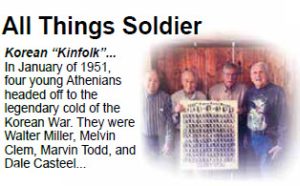By: Jerry Barksdale
South Vietnam, 1968. No one had to tell Major Clarence R. Little that Vietnam was a dangerous place. He had survived two thunderous mortar attacks and been shot by a Viet Cong sniper. Would his luck hold? Would he live to see his wife Diane and their two young sons again back in Sunnyvale, California? They never missed watching the nightly news, hoping to see him.
He was riding shotgun in a Jeep through “Mine Alley,” a stretch of road heavily mined by Viet Cong. Unknown to Little, they had buried explosives in the road with wires running to a tree line. A VC waited to set it off electrically by touching two wires together when an American vehicle passed over it. Standard policy, when seeing a mine hole, was to go fast and stop short or go slow, then speed up.
The driver spotted a mine hole and slammed on his brakes. The VC touched the wires together, but his timing was off. The blast occurred in front of the Jeep. Little’s luck was holding. “I got hit in the right hand with shrapnel.” No big sweat.
While on patrol, a booby trap with trip wires connected to a hand grenade was discovered. They marked the spot by laying two palm leaves over the trip wire, about a foot off the ground, so that his soldiers could see it. One man didn’t see the leaves and trip wire. A sergeant ran up to Little and yelled, “Mine!” Little turned around and looked at him just as it went off. “His back protected me. He had eleven holes in his back.”
Little, with shrapnel in his left leg, picked up his sergeant and carried him to a chopper. Both were evacuated to a hospital in Saigon.
After his leg was sutured, Little limped over to the officers club and ordered two drinks, drank one and carried the other back to his wounded sergeant. “You’d better down it now,” he said and went outside and sat down.
“I’m mad at you,” a woman’s voice said. He turned and saw his nurse. “Why are you mad at me?”
“You brought one of your men a drink, but didn’t bring one to me.”
The next morning Little awoke in the hospital and saw a medic outside cutting up sand bags and putting them on the grass to make it grow. The combat veteran nearly lost his cool. “I’d been begging for sand bags for months to protect lives and here they were using them to make grass grow in Saigon.” Little had enough of the hospital. He asked his nurse for permission to go purchase a new uniform. “You can’t leave the hospital,” she said. “You have another six days before you heal.” Finally she relented. Little purchased a new uniform, dressed and hightailed it to the airport where a Caribou aircraft was revving up. “Where you guys going?” he asked the Australian crew. “To the Mekong Delta, Yank.”
“Can I hop a ride?”
“Climb aboard Yank.”
Little landed in Vinh Long Province, spent the night in a fancy four story military building and was having chow in the mess hall when his old friend, Col. Rausch walked up. He invited Little up to the fourth floor for a drink. “When I walked in, it was a dance floor with orchestra pit and a bar,” says Little. “Very unwarlike.”
He sat down at the bar and ordered a Coke. “Have you had many of these?” he asked Rausch, referring to the dance. “Oh yeah, this is about the 5th or 6th dance we’ve had, every Friday night about 9 p.m. till midnight!” Little’s alarm bell went off. Pattern! Never, never establish a pattern. He excused himself, went downstairs, grabbed his .45 pistol, shoved it in his back waist band and returned to the bar. Little’s instinct was correct. “Sure as hell at midnight I heard a machine gun.” He ran over to a windowed door that lead to a balcony, looked down and saw the muzzle blast of a machine gun near the front gate. Knowing that a .45 pistol was no match for a machine gun, he ran back inside looking for a rifle; Little went down to the first floor and saw a soldier holding a carbine with a banana clip. “Give it to me!” Then he asked, “Are there any “friendlies” across the street?” The solder was hesitant. “My God man, I’m going to kill them! Do you have any friendlies across the street?”
“No sir! I’m not that drunk,” replied the soldier.
Little hurried back to the fourth floor, jumped over a man lying on the floor, and went to the balcony. He chambered a round and opened fire at the muzzle blast. Machine gun bullets stitched the wall within a foot of where Little stood. He emptied the carbine at the muzzle blast. “I ran back inside and had to jump over this same guy again. He was the colonel in charge of the whole damn thing.” Little ran downstairs looking for ammo. The soldier didn’t have any more, so he returned the carbine, pulled out his .45 pistol and went out the back door and over to the corner of the building. He saw the duty officer standing by the gate pillar. The duty NCO was behind the other one. Little ran over to the duty officer who asked him, “What do we do?” Little asked if a guard was inside the outpost by the gate. “Yessir, I heard him moan.” Little told him to open the gate, that he would draw enemy fire while they rescued the wounded man. “He opened the gate and I ran out and knelt down next to a dead VC and waited for the VC to fire again so I knew where the hell they were.”
The wounded guard was taken for treatment. Little and the duty officer ran down the street between the buildings and saw two mines the VC had set. They sandbagged both so that no one would activate them, then went down to the canal where the VC had come from. They were gone. When they returned to the entrance gate, Little stopped. He sensed danger. “Wait a minute!” That’s when he got scared. The buildings were full of Americans with weapons. “They don’t know us. They liable to shoot us,” he said. The duty officer yelled, “Hold your fire!”
They walked across the street and saw Col. Rausch and several soldiers. Rausch had two drinks in his hands. “I thought you could use one of these,” he said. “I sure can,” replied Little and downed one. The colonel in charge – the one lying on the floor rushed up. “Now, he was combat ready,” says Little. “He said the airfield was under attack and headed off in that direction. “Stop him!” said Little. “The VC have a machine gun set up to cover the road. They‘ll cut him to pieces. “
The colonel reconsidered and, instead, sent another officer and four men in a jeep. Says Little, “I later heard the VC cut them down.”
Little went to bed. The next morning the colonel in charge and his staff came marching into the mess hall where Little was having breakfast. “Now they are combat ready; got on flak jackets, helmets and have weapons,” says Little. “He asked if I was Major Little from Cang Long. Little stood. “Yes sir.”
“Don’t you ever come back. The VC followed you here.”
“Sir, I’m from the hospital in Saigon,” replied Little.
“Don’t ever come back.”
“I sat back down and away he went,” says Little, who soon departed Saigon and returned to Cang Long.
Two weeks later Col. Rausch flew in and dropped off a case of beer. “The colonel has put the duty officer and NCO in for a Silver Star,” he told Little. “He’s not putting you in because he says the VC followed you up there.”
“I killed a lot of VC that night,” replied Little, who knew the VC lived among them and could exact revenge anytime they wanted to. “I’d just as soon go home alive,” said Little. “Forget the Silver Star. Don’t tell anyone I did all those killings.”
The VC moved among the population and American soldiers were always at risk. “Sometimes you could tell who they were by the way they looked at you – hate in their eyes,” says Little. “They would put Agent Orange in water pistols and spray Americans. Once I was sprayed across the mouth when I passed a bunch of people.”
Shortly before departing Vietnam, Little picked up a piece of cheese on Sgt. Custer’s radio operations desk and ate it on the way to the team house. A rat awoke him gnawing on his finger. “It must have smelled the cheese. I had to go to Saigon and get a rabies shot.” Meanwhile, President Johnson visited Saigon. “I was supposed to get an award from him, but my team didn’t know where I was. I didn’t learn about it until after the President left.” Little never inquired about the proposed award. His mind was on more important things – going home.
January, 1969, Major Little boarded a plane at Tan Son Knut Airbase and flew home. Thank God he wasn’t in a body bag, but neither was he whole. He carried scars and shrapnel to prove it. In California, he picked up Diane and his two sons and they drove across country to New York. “We rode on a 4-lane free as a bird. When we got to a toll booth at the New York State line, they had their hand out – gimme.” Little didn’t like that.
Later, Little volunteered for the Green Beret, an elite Army group of select volunteers. This unique band of soldiers is summed up by a verse from S/Sgt. Barry Sadler’s song, “Ballad of the Green Berets”: “One hundred men will test today but only three will wear the Green Beret.” After a tour of duty with the 1st Special Forces in Indonesia and Okinawa, Little was eventually stationed at Redstone in Huntsville.
“When I came to Alabama, they put out their hands, but unlike New York, it was to welcome us.” He retired as a Lt. Col. in January, 1981, and he and Diane have lived in Limestone County on the Tennessee River since then. Both sons are Auburn ROTC graduates and served in the military. Douglas spent 10 years in the Army Corps of Engineers and lives in South Carolina. Jeffery, a rocket scientist who lives in Madison, Alabama, spent 20 years in the Air Force. Colonel and Mrs. Little have 5 grandchildren and 5 great grandchildren. Col. Little, age 85, still has a clear mind, but his body doesn’t respond as quickly as it did when he was an Army skydiver with 150 jumps that earned him a broken leg.
A shadow box on Little’s wall filled with medals and ribbons tells the story of a brave American who did his duty and did it well. He holds 3 Purple Hearts, Bronze Star for valor, Parachutist Badge, Combat Infantry Badge, National Defense Services Medal with Oak Leaf Cluster, Meritorious Service Medal, Army Commendation Medal, Vietnam Service Medal, Vietnam Campaign Medal and, the Vietnam Cross of Gallantry with Silver Star and Palm awarded for valor and heroic conduct while fighting the enemy. He is a Mason and a Shriner.
Having been challenged by bullets, booby traps, land mines, and mortar attacks in the past, this old warrior has taken up a new challenge – learning to play the organ. “That’s my passion now,” Little said and nodded toward an organ across the room. “Would you like to hear Guy Lombardo?” he asked me, and struck up “Auld Lang Syne.” Good job. “Here is my favorite,” he said, and played “Your Cheating Heart.”
By: Jerry Barksdale








 June 20, 2025
June 20, 2025



